A bill to regulate the use of facial recognition technology for law enforcement purposes in California was introduced Wednesday by Assemblymember Phil Ting, D-San Francisco.
The bill, Assembly Bill 642, would set statewide standards around the use of the technology aimed at protecting privacy and due process rights while acknowledging its use as a law enforcement tool.
Ting said the bill was needed because an effort to extend a ban on the use of the technology failed last year. In 2019, Assembly Bill 1215 paused the use of the technology in body cameras worn by local law enforcement across the state for three years. Since that temporary ban expired, there have been no rules regulating the use of the technology in the state. The new bill is supported by the California Police Chiefs Association.
“At this point there are no regulations,” Ting said at a press conference Wednesday introducing the bill.
The bill would prohibit a match from facial recognition technology from being used as the sole reason for an arrest, search or affidavit when seeking a warrant. It would codify a 98% level of accuracy for a match as the bar for use of the technology. It also restricts its use if it would prevent someone from exercising constitutional rights such as freedom of assembly.
State Sen. Steven Bradford, D-Gardena, the bill’s co-author, said the bill was a commonsense measure and would set clear parameters for when the technology could be used and when it should not be used. He said the language of the bill sought to address one of the biggest concerns about the technology, which is its inaccuracy in recognizing faces of people of color.
“One of the benefits of technology is that is does assist law enforcement in doing their job more efficiently and effectively, but we also know that in demonstrations that were held last year at the Capitol, many of my colleagues in the Legislative Black Caucus were wrongfully identified as criminals,” Bradford said.
Abdul Pridgen, a representative for the California Police Chiefs Association, said that facial recognition technology has an unprecedented ability to assist law enforcement in multiple ways.
“It is the objective of protecting our communities and preventing future crime that is driving law enforcement to develop responsible, appropriate and effective F.R.T. programs,” Pridgen said.
Pridgen said the technology would be used during the upcoming FIFA World Cup in 2026 and the Summer Olympics in Los Angeles in 2028.
AB 642 would also compel departments and agencies to adopt written policies governing the use of the technology, require that algorithms used in the technology are evaluated by the National Institute of Standards and Technology, and mandate annual reporting of those policies to the state.
The ACLU of Northern California has previously called the technology dangerous and said it threatens basic privacy rights and misidentifies people of color.
Copyright © 2023 Bay City News, Inc.
